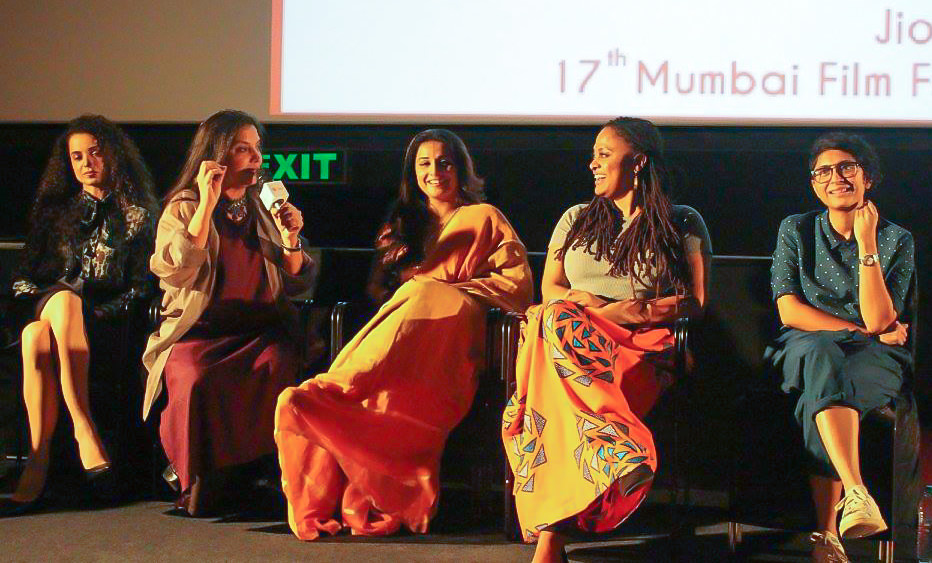
Gender bias is an issue that is prevalent in every strata of life. Since people don’t talk about it as strongly as they talk about other social topics like racism, the subject lies suppressed. More so in films, where men are the superstars and the reason behind “blockbusters”, while women are always walking in their shadows as their supporting co-actors. However more and more people are now embracing the idea of gender equality and as a result, subtopics like recognition, wage gap, professional uppishness against women, have climbed up the ladder and are being discussed with great fervor.
On November 3rd, 2015 during the week-long Jio MAMI Mumbai Film Festival, five women from the film industry came together to discuss ‘Women in Film’. The panel consisted of eminent actresses Shabana Azmi, Vidya Balan, Kangana Ranaut, filmmaker Kiran Rao, Golden Globe Award-nominated American filmmaker Ava DuVernay and was moderated by comedian Anuvab Pal.
Following are some excerpts from the discussion:
On ‘women-centric’ films
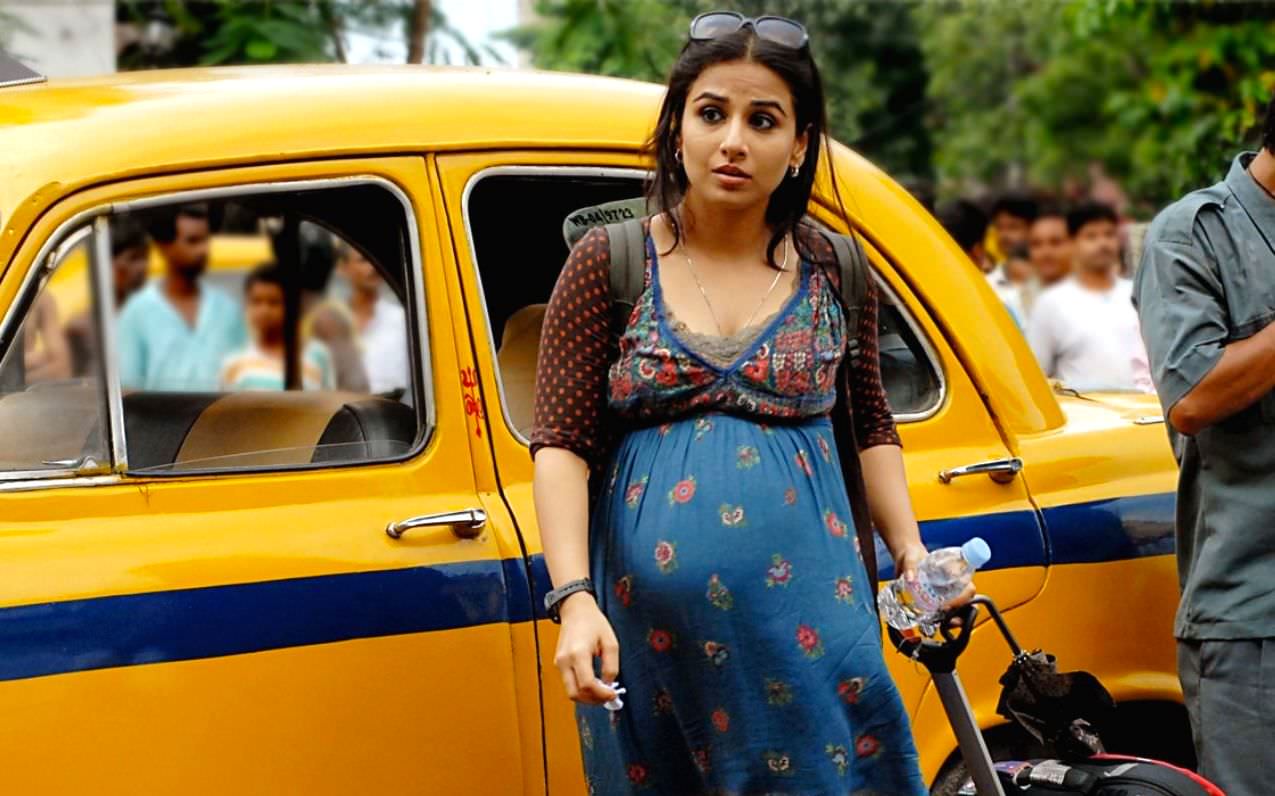
“When a female protagonist leads the film, it is dubbed as a female-centric film and is considered a hit, if at all, in its own little niche.” –Vidya Balan
[Pal]: Is it annoying or is it fine that gender and character are always connected when it’s a woman-centric film or story?
[Ranaut]: Gender and character have got nothing to do with woman-centric or male-centric films; it is about a character who has been loved and lived. It’s always about the artist who plays the character and not the character itself, which otherwise can cause complexes among the playing parties, men included. We have to see people as people, and artists as artists. Therein lies the first step at embracing the idea of equality.
(If you write an Annie Hall or a Vidya Bagchi or a Mr. India or any other character, is gender important?)
[Balan]: I think it has been a norm that every film is a male-centric film where the female characters or their identities have been very vague or are missing altogether. So that is why when a female protagonist leads the film, it is dubbed as a female-centric film and is considered a hit, if at all, in its own little niche. This can change in the future, but at this period of time, this specific distinction is still present.
“The characters that we saw in earlier times, with a few exceptions, were really about women in their stereotypical role as the forgiving wife, the understanding mother, or the sacrificing sister.” –Shabana Azmi
[Pal]: A question from the Internet to Shabana Azmi: Inherently strong female characters have always existed in Indian cinema care of directors like Hrishikesh Mukherjee, but these films have faded into history. Has this trend changed now, or have films always been inclusive of such female characters?
[Azmi]: No. You can count such films on your fingertips if you talk about movies like Duniya Na Mane (1959) or Mother India (1957). There was a time in mainstream Hindi cinema when there were lots of woman-centric films, films that were inhabited by actors like Nutan, Meena Kumari, and Mala Sinha to name a few. But look at the title of these films: they revealed what the values of the films were. For example, look at Main Chup Rahungi (1962) … ‘I Will Remain Silent’ was considered a virtue for women. And all the characters that we saw in earlier times, with a few exceptions, were really about women in their stereotypical role as the forgiving wife, the understanding mother, or the sacrificing sister. Then there was a change in phase through the late 80s and the early 90s where women characters were portrayed as obstinate yet submissive. First we had Rambos and then we had Rambellinas, but it had nothing to do with any complexity of what it meant to be a woman. It was really left to the Parallel Cinema to bring women in any kind of complexity. The time has of course changed and women have not only adorned the silver screen with characters that are protagonists but have also imparted a certain sense of autonomy, and thanks to actors like Vidya and Kangana who are keeping the lid open and higher than ever.
On directing big-budget films
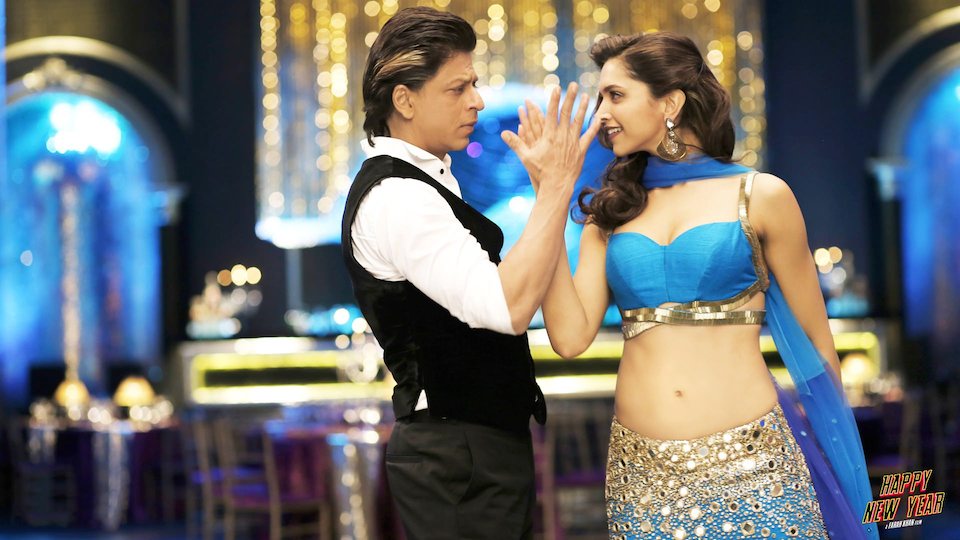
“To make a film in India is hard, and for women it’s doubly hard because of the social pressures that they are subjected to.” –Kiran Rao
[Pal]: In today’s scenario, is there a limit on the kind of movies people expect from someone, women directors like Kathryn Bigelow or Sofia Coppola? And is it an open landscape where you can select any genre that you like, be it action or mystery?
[DuVernay]: Definitely, at least in the United States, there is a kind of limit about the kind of films that a woman director can make, usually independent films like people talking inside a room. Kathryn Bigelow, for that matter, is an anomaly because she makes films about war and politics. I think it is truly because of economics that women are not given the budgets or the trust to do films outside of the romantic comedy genre or the indie dramas. Having said that, it is certainly not the lack of capability, or the lack of creativity, or the lack of desire. For women directors of different ethnicity, especially for the women of color or Latino women, filmmaking is tougher than it is for their counterparts, and thus, generally also involves a higher budget.
[Rao]: In India, I don’t think women have not made films for want of a budget. For example, two of our biggest female directors, Farah Khan and Zoya Akhtar, make these huge budget films which are mega blockbusters. So, here it’s not really about opportunities, but the fact that they want to come out and explore the art and find their voice in the mainstream. To make a film in India is hard, and for women it’s doubly hard because of the social pressures that they are subjected to. It’s an interesting time now that filmmakers focus more on the stories they want to tell, and not on the budget that is always calculated around the story and not the other way round.
[DuVernay to Rao]: So, here you can make an action movie?
[Rao]: Yes. If you have a good story that will fit well in that genre, definitely. Farah Khan made this huge heist movie called Happy New Year (2014) with Shah Rukh Khan which was part musical; so it’s evident that budget and genre are merely subjective.
[Azmi]: I don’t agree with Kiran. Because if you are making such a movie, then it really depends on the lead actor. If Farah didn’t have Shah Rukh to act in her film, the film would most probably have not seen the light of the day.
[Rao]: Of course, if Farah wants to make a film, she will need a Shah Rukh to star in it. But from a filmmaker’s perspective, however, the casting is only secondary.
On unequal pay
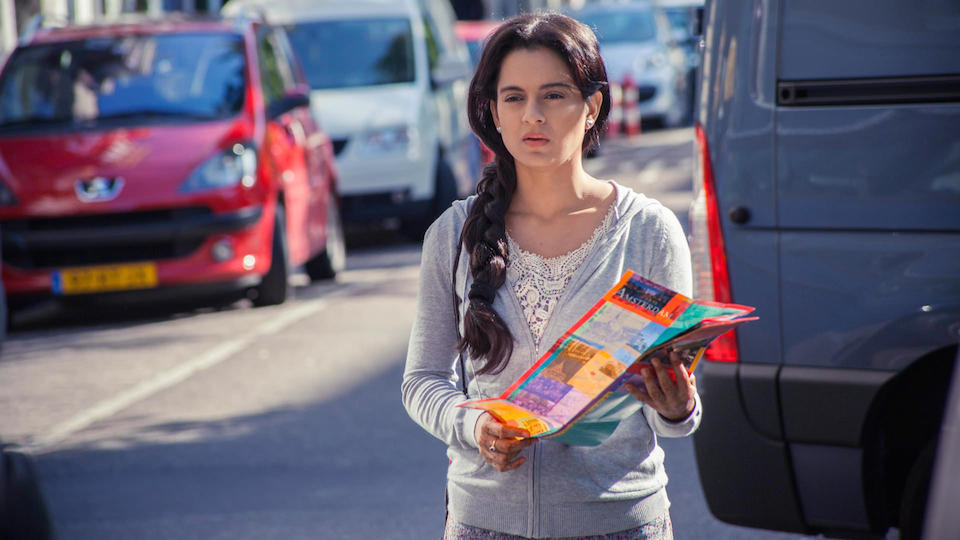
“Big producers and studios pressurize actresses with the kind of exposure that they would get upon acting in a certain film. So why worry about filling your purse?” –Kangana Ranaut
[Pal]: What is the logic that governs unequal pay, if such a thing exists?
[Ranaut]: There is this notion that female actors do not contribute to films as much as their male counterparts do, but even if we ignore this illogical deduction, the fact is that we, as female actors, are not yet ready to receive greater monetary benefits. And the problem lies in the practice among big producers and studios who pressurize actresses with the kind of exposure that they would get upon acting in a certain film. So why worry about filling your purse? This practice has to stop, and if we are to do that, we must start by standing up to the cause.
[Balan]: We tend to undervalue ourselves and that is really a product of conditioning. It is a very subtle speck of a kind of oppression that is working against this issue of equal pay when it comes to women. But we also have to take into consideration the budget of the film that you are doing. You cannot expect the producer to pay you more than he/she is capable of, as far as the total budget of the project is concerned. So comparing the price with that of male superstars would obviously lead to the film not getting made. Whether he/she is willing to pay you is what really matters. And I for one have always received what I have asked for because I have mostly done low budget films. Although, I have seen growth and if I compare the present times with where I started, the journey has been greatly rewarding and I can’t complain.
On the gender-bias in filmmaking
“There is not a chance that a female director can make those 400-million-dollar Marvel or DC comic movies which are real popcorn grabbers. The big production houses will rather hire a newbie male director.” –Ava DuVernay
[Pal]: What is the role of gender in films, generally?
[Azmi]: Inherently, we live in a patriarchal society, because that is why the profession of acting was soon divided between the genders as people started calling male actors as actors and female actors as actresses. I don’t really have a problem with it because I don’t get why suddenly gender has to come in between a profession. Money in the mainstream was good during the old times, but if I asked Shyam Benegal the same amount of money, he wouldn’t be able to make the film. So for me, the price is always dependent on the budget of the film. For instance, take Deepika Padukone, such a huge star who charges so and so money for her films. But she cannot charge the same amount when she does a film like Finding Fanny (2014). So it is for the individual to decide what she wants to promote: the art or the profession.
[DuVernay]: There is not a chance that a female director can make those 400-million-dollar Marvel or DC comic movies which are real popcorn grabbers at the moment. The big production houses will hire a newbie male director, but eyebrows will be raised if a female director shows tiny sign of interest in making one. We never get the opportunity to make such films.
[Pal]: Are there any instances that you have come across in movies that are riddled with backward thinking?
[Balan]: I am quite tired of seeing the glorification of the mother in mainstream Hindi films. There is no realism when it comes to mothers in films where they always end up blaming their daughters for screwing up a situation or something in the same line.
[Pal]: Taking into account that women are really keeping up with men when it comes to comedy, like women hosting the Oscars and female actors donning the cap of comedians in spy films, is it fair to say that people have finally come to accept that women can be really funny?
[DuVernay]: The field of cinema has two sections namely the dominant one and the submissive one. The former contains white males who are free to choose and make movies on their will, and also play a part in deciding what is normal and what is not. So when an Asian filmmaker or a colored filmmaker or an African filmmaker makes a movie, it is inherently regarded as a niche product which does not really gets much attention. However, after the huge success of an American TV show called Empire about black people in the entertainment industry which premiered last year, we started wondering if people really had started accepting us as artists. I have countless other examples which point to this fact, but the final product still gives out dismal results.
On item numbers
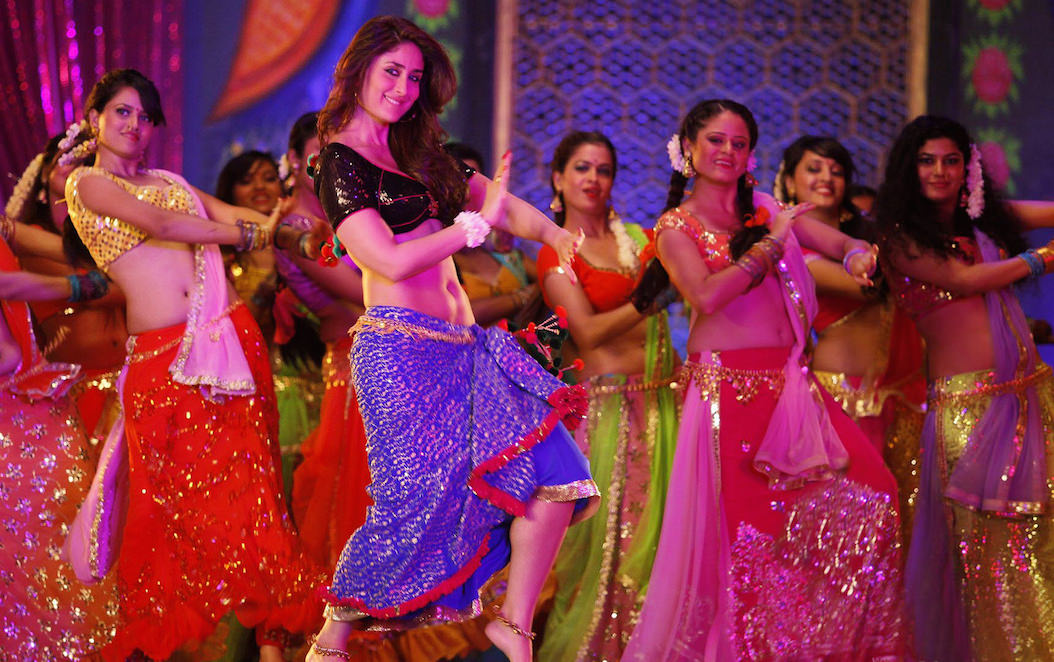
“When you have a woman with a heaving bosom, a shaking navel, and a swiveling hip, in fragmented images, you are robbing her of all autonomy and subjecting her to the male gaze and that is not a celebration of sensuality.” -Shabana Azmi
[Pal]: One word – item numbers!
[Azmi]: It’s an entity by itself – item numbers – which have nothing to do with the film. The interesting thing about item numbers is that the actors who take part in it claim that if a male actor can expose his behind then why can’t she expose her cleavage, which is like commodifying yourself. In actuality, you are surrendering to the male gaze, because the business of cinema is the business of images. So when you have a woman with a heaving bosom, a shaking navel, and a swiveling hip, in fragmented images, you are robbing her of all autonomy and subjecting her to the male gaze and now, that is not a celebration of sensuality.
On the age factor
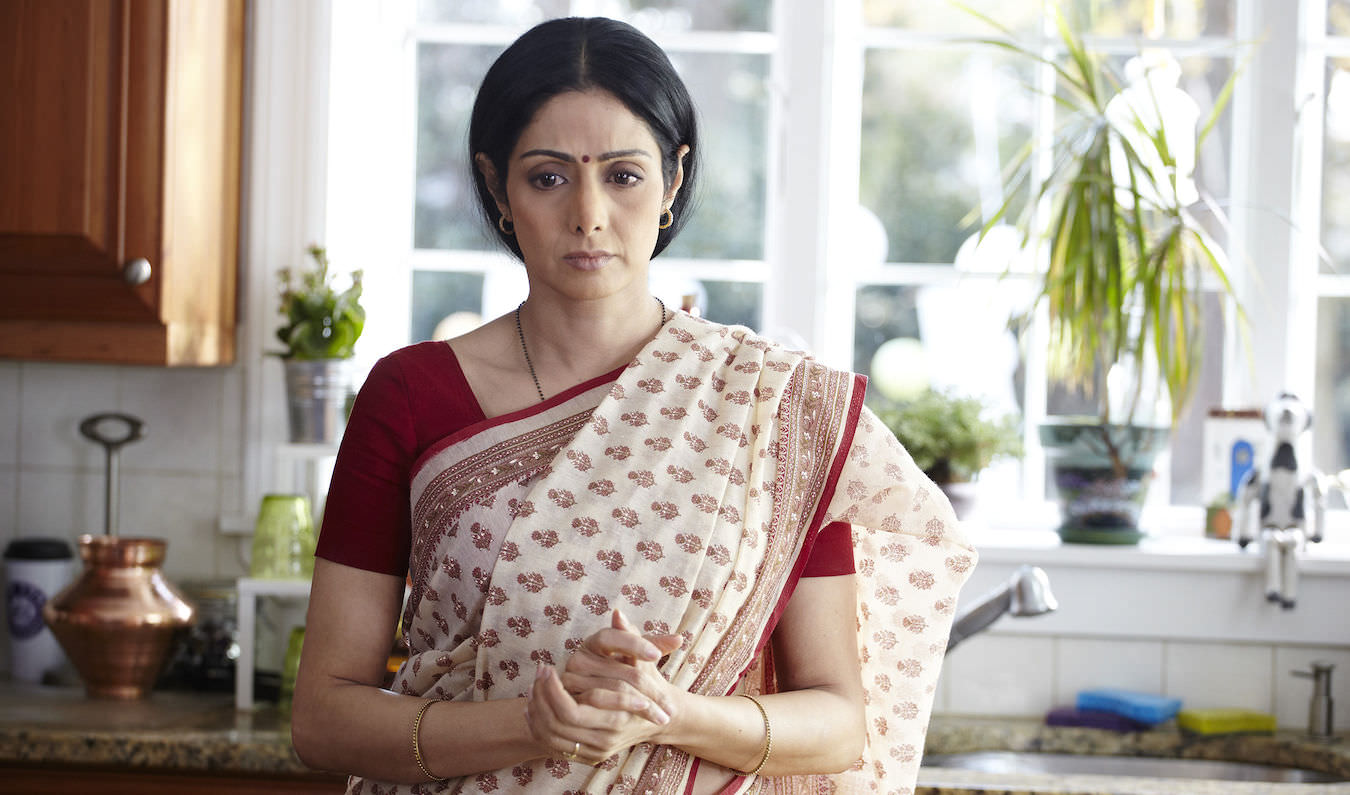
“I don’t see anything wrong with playing an aunt or a granny. It’s not a societal problem; it’s our problem that we don’t accept our age.” –Kangana Ranaut
[Pal]: What role does age play when it comes to male and female actors?
[Ranaut]: I don’t see anything wrong with playing an aunt or a granny. It’s not a societal problem; it’s our problem that we don’t accept our age. I have always got older characters, and I was good at playing them, so I don’t really have qualms with playing a character of a different age as far as it is a sensible one.
[Balan]: I didn’t really mind doing The Dirty Picture (2011). I remember when I was working on that film, a lot of people came to me and warned me that people don’t see me as a sex symbol, and that portraying the role would make me lose everything. I said that I hadn’t really made anything of myself, and this could just be the chance where I do. And if not, I will start again. So, I don’t have a problem playing the mother of another actress at the age of 31 as long as there is sense to it and the maker really wants me to don the role.
[Rao]: It is appalling to see how people in the room react to your suggestions during a casting meeting. There is no novelty when it comes to casting people for characters, so age really becomes a factor.
On role models
[Pal]: Who are your role models?
[Balan]: Mine is sitting right here – Shabana ji – and I have said this numerous times in the past. I remember watching Arth (1982) and I loved how she looked so unapologetically strong. If I can speak of her, I think her work has always been the extension of her beliefs. Shabana Azmi has always been the role model for me, and it is a big deal for me to be here today.
[Ranaut]: I wasn’t exposed to films at all till I was fifteen-sixteen. As a child, I wanted to be like my grandfather and his father before – who were successful and powerful men in their professions.
[DuVernay]: Oprah Winfrey. She is someone whose work reflects who she is. She changed the face of American television and she embraced spirituality and socio-domestic issues when no one was talking about them.
[Rao]: Kiran Bedi, because it was such a big deal to become a police officer. She’s not really my role model, but I respect her for what she is as she also ignites a sense of doing inside me.
[Azmi]: Liv Ullmann, she really has been my role model. She is my favorite female actor as well.
The panelists frankly shared their life stories and struggles in their profession, but the icing on the cake was Miss DuVernay’s comment on the serious subject of piracy. The director behind the Academy Award nominated film Selma (2014) has no problem with illegal downloads.















